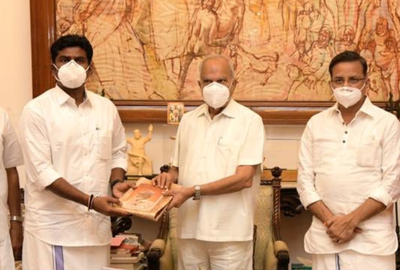Top Searches
- News
- City News
- chennai News
- VCK and Congress flay TN governor for taking photos with BJP leaders
VCK and Congress flay TN governor for taking photos with BJP leaders

Tamil Nadu governor Banwarilal Purohit (middle) with BJP state unit president K Annamalai (left)
CHENNAI: The Congress and VCK have criticised Tamil Nadu Governor Banwarilal Purohit after the Raj Bhavan released his photo with BJP’s Tamil Nadu unit president K Annamalai and senior leaders who called on him on Friday. They said the governor had earlier refused to take pictures with VCK leader Thol Thirumavalavan and Congress leaders.
VCK deputy general secretary Vanni Arasu took to social media to vent his ire and asked:“Is Rajbhavan a sanghi retreat?”. He recalled party leader Thirumavalavan’s meeting with the governor on July 8 to submit a petition urging him to consider qualified candidates from the adi dravidar community to fill the vacant posts of vice-chancellors of the universities in the state.
“On request, the governor had refused to have a photo taken (with Thol Thirumavalavan) of the meeting. Today, he entertained @BJP4TamilNadu leaders with a press release. Is Rajbhavan a sanghi retreat?” Vanni Arasu tweeted.
“If it’s policy to deny the request of a member of parliament and party president,” he wondered and slammed the governor and his office for releasing the photograph with BJP leaders.
President of Tamil Nadu Mahila Congress and vice president at Madras High Court Advocates Association R Sudha posted a tweet condemning the governor. “TN governor last week refused for a photo with us showing an anti-women attitude. But like a committed Sangh Parivar member, he posed for a photograph with a BJP member. Governors are constitutional entities who must transcend political and communal affiliations. We strongly condemn this,” she tweeted and attached the picture of the governor with BJP leaders and the paper cutting on the governor's refusal to meet the Congress leaders.
“Along with MP Jothimani and party floor leader Selvaperunthagai, I went to submit a memorandum regarding fuel and domestic gas price hike. The governor had refused to take pictures when we submitted the memorandum and told us that he stopped taking photographs of late. Now, he has taken photographs with BJP leaders. It's like demeaning the people's elected members and people's relevant issues and giving importance to affiliation to a particular party,” Amudha said.
VCK deputy general secretary Vanni Arasu took to social media to vent his ire and asked:“Is Rajbhavan a sanghi retreat?”. He recalled party leader Thirumavalavan’s meeting with the governor on July 8 to submit a petition urging him to consider qualified candidates from the adi dravidar community to fill the vacant posts of vice-chancellors of the universities in the state.
“On request, the governor had refused to have a photo taken (with Thol Thirumavalavan) of the meeting. Today, he entertained @BJP4TamilNadu leaders with a press release. Is Rajbhavan a sanghi retreat?” Vanni Arasu tweeted.
“If it’s policy to deny the request of a member of parliament and party president,” he wondered and slammed the governor and his office for releasing the photograph with BJP leaders.
President of Tamil Nadu Mahila Congress and vice president at Madras High Court Advocates Association R Sudha posted a tweet condemning the governor. “TN governor last week refused for a photo with us showing an anti-women attitude. But like a committed Sangh Parivar member, he posed for a photograph with a BJP member. Governors are constitutional entities who must transcend political and communal affiliations. We strongly condemn this,” she tweeted and attached the picture of the governor with BJP leaders and the paper cutting on the governor's refusal to meet the Congress leaders.
“Along with MP Jothimani and party floor leader Selvaperunthagai, I went to submit a memorandum regarding fuel and domestic gas price hike. The governor had refused to take pictures when we submitted the memorandum and told us that he stopped taking photographs of late. Now, he has taken photographs with BJP leaders. It's like demeaning the people's elected members and people's relevant issues and giving importance to affiliation to a particular party,” Amudha said.
FacebookTwitterLinkedinEMail
Start a Conversation
end of article

